Andrew Furst's Blog, page 125
June 19, 2015
Modern Koans – 10 Questions Buddhists Get
 Modern Koans is an ongoing series that recognizes that good questions are often more important then their answers.
Modern Koans is an ongoing series that recognizes that good questions are often more important then their answers.
The riddles of God are more satisfying than the solutions of man. ― G.K. Chesterton
10 Questions Buddhist Get
I get questions about Buddhism fairly regularly. Here are some of the more common ones.
1. What is the goal of Buddhism?Many of the worlds religions have goals. Christians and Muslims seek eternal life. Confucians aspire to harmony and order. Hindus seek union with the divine. Buddhism takes as it’s goal liberation.
Liberation from what? Shortly before he died, the Buddha was purported to have said, “I have taught one thing and one thing only, dukkha and the cessation of dukkha.”
Dukkha, roughly translated, can mean suffering, anxiety, stress, or discontentment. The Buddha pointed out that a lot of the time we are suffering and often we are the cause of it. Then he told us the source of suffering and how to reduce it. He gave us the tools to reduce our own misery. This is what liberation is – freedom from suffering.
2. Do Buddhist reject the world?Buddhism came into being on the Indian subcontinent. One of the fundamental tenets of Indian philosophy is recognizing the fallacy that we might achieve sustained happiness from things that don’t last. Renouncing transitory pleasures lies at the heart of many of India’s traditions. The Buddha took a slightly broader view of the problem. He acknowledged that we can not find lasting contentment in the fleeting pleasures of the world. But he also pointed out that rejecting the world isn’t the solution either.
The Buddha’s way, sometimes referred to as the middle way, avoids both extremes. He suggests that the root of our suffering is in how we respond to the world. If we expect lasting contentment from fleeting pleasure, we’ll be instantly disappointed. If we renounce the world, we reject the only source of contentment available to us. What lies in the middle? Acceptance of the world, as it is and recognizing that everything in life is fleeting and, therefore precious.
3. Do Buddhist believe that life is only suffering?While the Buddha spoke prolifically about suffering, his goal was reducing it. He was clear that it is an uncommon person who truly finds contentment. People flock to consumption or abstinence. But ironically when those strategies only produce temporary satisfaction, instead of adjusting our approach, we redouble our efforts. We up our consumption or further emaciate ourselves. But gluttony and deprivation do not lead to contentment. These tendencies to be blind to our folly are subtle and pervasive, in part because we are pleasure seeking animals armed with conscience and intellect.
So no doubt, acknowledging our propensity to suffer is an important first step. But there is much more to Buddhism than just suffering.
4. What is enlightenment?This one is tricky, elusive, and startlingly simple all at the same time. The word Buddha comes from the Pali word Bodhi which means awake. So enlightenment could be considered being awake. At it’s essence it is the gift of sentience. The Chinese use the term ming or luminosity – giving us the light in enlightenment. Being seems to be awareness. This awareness is something that we share with everyone past, present, and future. But it’s a quality that is often lost on us. Preoccupied with the addictions and obsessions of our daily routines, we forget the miracle of being that lies at our very core. The practice of Buddhism is less about seeking something new, and more about rediscovering what we truly are.
5. Do Buddhist believe in God?Buddhism is described as non-theistic. As I mentioned earlier, it starts and ends with suffering and its cessation. There is no appeal to a God for liberation. But that is not to say that Buddhism eschews worship and a concept of the divine. Everything in life is fleeting and, therefore precious. Sacredness permeates everything that we witness and thus everything is worthy of worship.
6. Where do Buddhists believe morality comes from, if not God?Morality is learned. Long before any holy book was written, our sense of right and wrong has been instilled in us through experience and by culture. The golden rule is advice hard earned by the human race as we’ve evolved as sentient creatures capable of reason, communication, and empathy. Buddhist see morality as a natural consequence of our humanity.
Morality blossoms as we develop wisdom and compassion. The wisdom to see the causes of our suffering and the suffering of others. Compassion for others as we recognize we all suffer in some degree. So while Buddhist often remain silent on the question of God. They are very in tune with a natural morality that is familiar and real.
7. Do Buddhists Pray?Yes, but being a non-theistic religion, Buddhist prayer has a different quality. I can speak from my experience as a Pure Land practitioner. We chant the name of the Buddha, a particular Buddha called Amitabha – the Buddha of Endless Light and Endless Life. The recitation is accompanied by a sincere hope to be reborn into Amitabha’s Pure Land. Once there, the chanter is assured liberation. Buddhists also perform offerings to Buddha’s, Bodhisattvas, Dakas, Dakinis, Gods and Goddesses.
But it’s also worth noting that the subject of worship are not Gods in the tradition of Yahweh or Allah. To most Buddhists they are more a reflection of the sacred nature of our world.
8. Is Buddhism a Religion or a Philosophy?I think the answer is yes.
Is it a philosophy? Philosophy, strictly speaking, is the love and study of ideas. Philosophers tend to be occupied with looking deeply at the fundamental questions of life like: what is existence; what is real: what is knowledge; what is morality: and so on. Buddhism has things to say about all these questions. The Buddha was fairly clear that knowledge relates to things that are within our sensory experience. Questions beyond the reach of experience are speculation. For example what happens after we die, or is there a God, cannot be answered through experience. Questions of this type may not merit answers, as they are arbitrary, unverifiable, and most importantly lead to more suffering.
The Buddha also offered an exploration of morality in the form of the eight-fold path, and touched on the nature of being in the second noble truth. So in many respects, there may be justification for calling Buddhism a philosophy.
Is it a religion? Buddhism is generally acknowledged as a religion. But let’s briefly examine the assertion. The origin of the term religion is from the Latin Religare or Religio to bind fast or the bond between humans and the gods. Because Buddhism is described as non-theistic, there may be contention about classifying it as a religion. But as I mentioned above, there is certainly an appreciation of what is sacred. Taking the latter as a workable definition, I’d say we can confirm that Buddhism is a religion.
9. Why do Buddhists meditate?Meditation is about a sensory experience with “reality.” So much of our daily lives is carried out in our heads in the form of ideas, routines, and assumptions. Meditation is an opportunity to ground ourselves in what’s real and to challenge our assumptions about the world. Only by looking deeply at what’s really happening in the here and now, can we really know anything. While not all Buddhists meditate (in fact only a minority do), the Buddha’s prescription for life includes seeking right view, right concentration, and right mindfulness. Meditation is an effective method for filling this prescription.
10. Does meditation mean stopping your thoughts?There is only one way I could imagine where you might stop your thoughts, and you’re not going to like it.
Unless we are dead (and I don’t even know for sure what happens then), we will always be living in a sea of thoughts. The approach is similar to the middle way. First discipline your mind to wander less by developing your powers of concentration. Second, develop a healthy relationship with your mind so that when thoughts arise, they do not control us. If we let our thoughts control our life’s agenda, it becomes something like the tail wagging the dog. This is fertile ground for suffering.
Moving towards a mature relationship with our thoughts through discipline of the mind and right view leads us to a healthy balance. Meditation is about stopping suffering, not our thoughts.
What do you think? I’d love to hear your thoughts in the comments section below.
Get Each Week's Modern Koan in your email boxFirst Name:
Last Name:
Email address:
In addition to a monthly email you can also subscribe to the following weekly series:
One Minute Meditations
Tiny Drops (Photography series)
Compass Songs (My Favorite Poems)
Dialectic Two-Step
Modern Koans (interesting questions)
Sunday Morning Coming Down (Music Videos)
Relics (Timeless Republished Articles)
Say What?
Quotes
Verse Us (Poems I Write)
The post Modern Koans – 10 Questions Buddhists Get appeared on Andrew Furst.
June 18, 2015
Quote – Søren Kierkegaard on Wishes

Wishes
The post Quote – Søren Kierkegaard on Wishes appeared on Andrew Furst.
One Minute Meditation – Reflection
 One Minute Meditations is an ongoing series of short videos, poems, and commentary intended as a meditation. Offered as an opportunity to step back from your cyber routine and settle into a more natural rhythm, if only for a minute.
One Minute Meditations is an ongoing series of short videos, poems, and commentary intended as a meditation. Offered as an opportunity to step back from your cyber routine and settle into a more natural rhythm, if only for a minute.
Another video from Brackett Pond in Harold Parker State Forest. Meditation is often viewed as an opportunity to reflect on life, yourself, or some idea. But we also want to consider other types of reflection. In the video, we see the images of the trees and the clouds. We have little trouble recognizing the mirrored images, but also see the little distortions that come from movement in the water.
Such is the nature of our mind. When it is still, we can see clearly. When it is shifting and moving our vision becomes distorted, we find it difficult to see things as they are. We also become engaged by the distortion itself.
Take a moment to recall still mind and its clarity.
Get Each Week's One Minute Meditation in your email box
First Name:
Last Name:
Email address:
In addition to a monthly email you can also subscribe to the following weekly series:
One Minute Meditations
Tiny Drops (Photography series)
Compass Songs (My Favorite Poems)
Dialectic Two-Step
Modern Koans (interesting questions)
Sunday Morning Coming Down (Music Videos)
Relics (Timeless Republished Articles)
Say What?
Quotes
Verse Us (Poems I Write)
If You Watched The One Minute Meditation, How Do You Feel? Note: There is a poll embedded within this post, please visit the site to participate in this post's poll.
The post One Minute Meditation – Reflection appeared on Andrew Furst.
June 17, 2015
Verse Us – Heart(beat) – A Video Poem
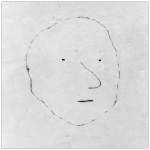 Verse Us - Poems I write: haiku, senryu, mesostics, free verse, random word constructions, I might even use rhyme or meter once and a while.
Verse Us - Poems I write: haiku, senryu, mesostics, free verse, random word constructions, I might even use rhyme or meter once and a while.
It’s hard to see how you might tame a heart
Considering how we poke and prod it
Fact is watching mine is not exactly at the top of the list
I’m tempted to bring it out in public,
Into the heat or under the moon.
Fluttering to the rhythm of the earth.
The post Verse Us – Heart(beat) – A Video Poem appeared on Andrew Furst.
Tiny Drops – The Buzz
 Tiny Drops is an ongoing iPhoneographic series. The images represent moments of noticing on my part. For you, they are an offer to pause, observe, and take that noticing into your life. All photos are mine unless noted otherwise.
Tiny Drops is an ongoing iPhoneographic series. The images represent moments of noticing on my part. For you, they are an offer to pause, observe, and take that noticing into your life. All photos are mine unless noted otherwise.
 These works by Andrew Furst are licensed under a Creative Commons Attribution-NonCommercial-ShareAlike 4.0 International License.
These works by Andrew Furst are licensed under a Creative Commons Attribution-NonCommercial-ShareAlike 4.0 International License.
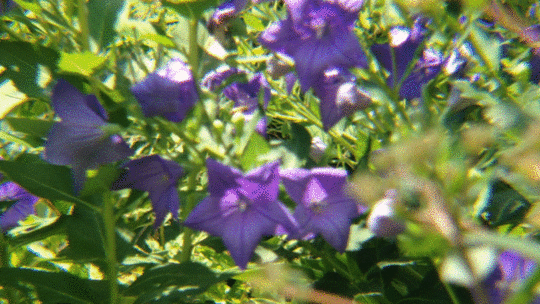
Here is a cinemagraph of a bee in our garden.
Get Each Week's Tiny Drops in your email box.mc4wp-form input[name="_mc4wp_required_but_not_really"]{display:none !important}First Name:
Last Name:
Email address:
In addition to a monthly email you can also subscribe to the following weekly series:
One Minute Meditations
Tiny Drops (Photography series)
Compass Songs (My Favorite Poems)
Dialectic Two-Step
Modern Koans (interesting questions)
Sunday Morning Coming Down (Music Videos)
Relics (Timeless Republished Articles)
Say What?
Quotes
Verse Us (Poems I Write)
FIVE LIMITLESS THOUGHTS
May all living beings have happiness and its causes
May all be free from unhappiness and its causes
May all dwell in equanimity, free of attraction and aversion
May all quickly find the great happiness that lies beyond all misery
May all enjoy inner and outer peace now and forever
NAMO AMITOFOThe post Tiny Drops – The Buzz appeared on Andrew Furst.
June 16, 2015
Say What? – What Is Our Real Nature?

Say What? is an ongoing series of laconic exchanges on Buddhism in the format of a comic strip.
This shirt is dry clean only. Which means... it's dirty. - Mitch Hedberg
What Is Our Real Nature?
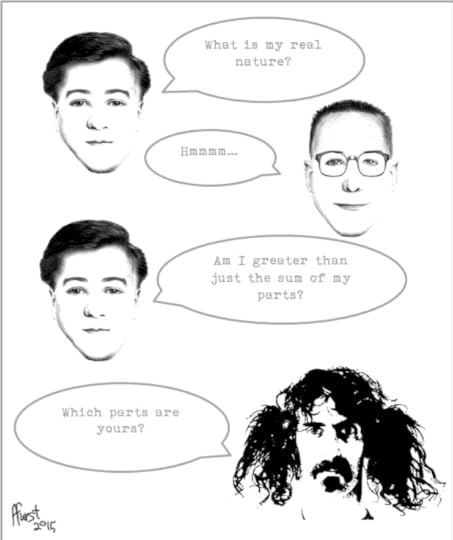
A Few Words On Our Real Nature.
Get Each Week's Say What? in your email box
First Name:
Last Name:
Email address:
In addition to a monthly email you can also subscribe to the following weekly series:
One Minute Meditations
Tiny Drops (Photography series)
Compass Songs (My Favorite Poems)
Dialectic Two-Step
Modern Koans (interesting questions)
Sunday Morning Coming Down (Music Videos)
Relics (Timeless Republished Articles)
Say What?
Quotes
Verse Us (Poems I Write)
The post Say What? – What Is Our Real Nature? appeared on Andrew Furst.
Compass Songs – Epitaph on a Tyrant
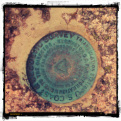 Compass Songs is an ongoing series of works by poets that I enjoy. Poetry, as the Zen Masters have said, is like a finger pointing to the moon. It speaks the unspeakable.
Compass Songs is an ongoing series of works by poets that I enjoy. Poetry, as the Zen Masters have said, is like a finger pointing to the moon. It speaks the unspeakable.
by W. H. Auden, 1907 – 1973
Perfection, of a kind, was what he was after,
And the poetry he invented was easy to understand;
He knew human folly like the back of his hand,
And was greatly interested in armies and fleets;
When he laughed, respectable senators burst with laughter,
And when he cried the little children died in the streets.
First Name:
Last Name:
Email address:
In addition to a monthly email you can also subscribe to the following weekly series:
One Minute Meditations
Tiny Drops (Photography series)
Compass Songs (My Favorite Poems)
Dialectic Two-Step
Modern Koans (interesting questions)
Sunday Morning Coming Down (Music Videos)
Relics (Timeless Republished Articles)
Say What?
Quotes
Verse Us (Poems I Write)
The post Compass Songs – Epitaph on a Tyrant appeared on Andrew Furst.
June 15, 2015
Dialectic Two-Step – Beyond the Delusion of Permanence
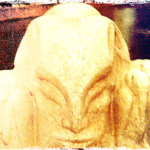 Dialectic Two-Step is an ongoing series of my thoughts on questions that come my way.
Dialectic Two-Step is an ongoing series of my thoughts on questions that come my way.
Wisdom lies neither in fixity nor in change, but in the dialectic between the two. - Octavio Paz
A Quick Glimpse Beyond the Delusion of PermanenceSomeone asked an interested question on Ello a while ago. It was on the topic of Taoism and a little esoteric. But it’s something that I think can be well understood. The delusion of permanence and the desire for immortality is the most significant barrier to freedom. But it doesn’t require a lot of nuanced understanding to discover this. I thought the image above was a good illustration of the point I want to make. We think and speak in terms of still images (permanence), but the truth is that life is more like a movie, constantly shifting from one frame to the next (impermanence).
Ello Question: Is it good to “store up one’s chi”? Or is it better to let that stuff FLOW? What are the Taoists suggesting?
A little background on the question. As with all religious traditions, Taoism has many flavors. There are many texts beyond the classics known to the west like Laozi (Tao Te Ching) and Zhuangzi. Many of these texts form the basis for teachings taught today. Taoism is also inseparable from many other well known Chinese beliefs, arts, and sciences, including martial arts (Taiji), energy work (qigong), and a Taoist pantheon of immortals.
And as will be found in any religious tradition, there will be found literalists who take these texts at face value, or search for hidden codes. In fact, the Taoist texts explicitly lend themselves to this type of reading. For instance The Book of Balance and Harmony: A Taoist Handbook offers teachings on energy work which frequently hint at immortality through the practice of preserving qi. Many texts talk about preserving semen and other bodily fluids as a way to preserve life force in the body. Other texts use the term alchemy. Suggesting that some concoction of practice and ingested substances can lead to immortality. This substance is sometimes translated as quicksilver (mercury) and the process of transcending mortality called a quickening.
To me this idea has always flown in the face of wu wei – doing by not doing. This is a key Taoist principle firmly embedded in the Tao Te Ching. It is analogous to the Buddhist concepts of impermanence and emptiness. All of which acknowledge that change happens on its own terms and in many ways beyond our control. The most glaring example of this is our own mortality.
Here’s how I responded:
I see the “storing” Taoists as permanence seekers & thus missing the Tao entirely. The alchemists were graspers and ironically died of mercury poisoning seeking immortality. Less radical “storers” preserve everything from semen to qi in some impossible way.
In my opinion, hoarding qi in our rather tiny and flimsy body/containers is absurd, like an ant hoarding a grain of sand on a beach. The real boon is to open yourself to allow the energy of the entire universe flow through you unimpeded. That’ll get you amped up (pun intended)
Get Each Week's Dialectic Two Step in your email box.mc4wp-form input[name="_mc4wp_required_but_not_really"]{display:none !important}First Name:
Last Name:
Email address:
In addition to a monthly email you can also subscribe to the following weekly series:
One Minute Meditations
Tiny Drops (Photography series)
Compass Songs (My Favorite Poems)
Dialectic Two-Step
Modern Koans (interesting questions)
Sunday Morning Coming Down (Music Videos)
Relics (Timeless Republished Articles)
Say What?
Quotes
Verse Us (Poems I Write)
The post Dialectic Two-Step – Beyond the Delusion of Permanence appeared on Andrew Furst.
June 14, 2015
Two Minute Meditation – Life’s Little Prayers
 One Minute Meditations is an ongoing series of short videos, poems, and commentary intended as a meditation. Offered as an opportunity to step back from your cyber routine and settle into a more natural rhythm, if only for a minute.
One Minute Meditations is an ongoing series of short videos, poems, and commentary intended as a meditation. Offered as an opportunity to step back from your cyber routine and settle into a more natural rhythm, if only for a minute.
This is an exciting special edition of One Minute Meditations. My wife purchased two praying mantis egg cases from the Butterfly Place in Weston, MA when we visited last month. We had almost given up on seeing them hatch. But this morning my wife burst into the bedroom with the news that they had hatched. Yay. Our prayers had been answered (sorry, couldn’t resist the pun)
I took a quick video and then my son released them into our yard. Hopefully we’ve introduced some new neighbors to the neighborhood.
These little mantises offer a nice little metaphor in their name and appearance. Prayer in Buddhism is one of those open questions newcomers have. Do Buddhists pray? Yes we do. I also want to keep that assertion as open as possible. When we think of prayer in the Abrahamic traditions, there is a listening for or a calling out to a deity. There is a cultural instinct here in the US to pray for the victims of disasters, to pray for someone we know who is in trouble or ill. We pray for guidance and we pray for material things. We pray to give thanks to what we have and we pray for what we hope for in the future. I would be disingenuous if I were to claim that Buddhists who grew up in the west did not pray in this way. We do.
In the Pure Land tradition, we also learn is slightly different type of prayer. The primary element of our practice is chanting the name of the Buddha. Specifically Amitabha Buddha, the Buddha of endless light and life. This Buddha is not a deity in the same vein as Allah or Yahweh. Amitabha is not considered separate from ourselves and our world. He is not a God as we understand God in the US.
We chant the name of the Buddha with the sincere desire to be reborn in the Pure Land. The Pure Land is roughly synonymous with the Abrahamic concept of heaven, with some nuanced differences. I think it’s useful to draw an analogy to the Christian idea of being born again. This rebirth can be seen as metaphorical (though it is important to note, that in Asia and to many practitioners in the west, reincarnation is squarely embedded in the understanding of this doctrine). The Pure Land is characterized as a place where the Dharma is proclaimed by the birds, the tress, and the wind. When we achieve rebirth in this place, we cannot regress to samsara – the wheel of suffering.
I offer one interpretation of this Pure Land as being mindfulness in the present moment. Our mantises, with their genetically imposed gestures of prayer, give us a little reminder that we might always be praying to Amitabha for rebirth in the Pure Land. That this prayer might be an act of listening to the Dharma in every breath, in every difficult moment, and in every experience of joy. By calling out the name of the Buddha – the awakened one – we might be awake in this moment, and the next.
These videos are produced for those of us who spend an inordinately large amount of time in the cyber-world. They are not a substitute for unplugging from your devices and taking a stroll near trees, water, or a patch of unkempt grass. Getting out into the world - touching, smelling, hearing, and seeing nature is the best way to reconnect with our prime purpose. What is our prime purpose? We are feeling and sensing machines. We are the universe looking back on itself. We are witness to the wonders and dangers of living in this corner of the cosmos. We are the seekers looking for connection a little further beyond yesterday's borders and boundaries.
But sitting and staring at the screen robs us of the sustenance that we rely upon for wonder and sanity. These videos are an opportunity to bring the sensations of nature to you, while you're in the cyber-world. Its an opportunity to relax your gaze, resettle your posture, and regain some depth in your breath. Listen and watch the video and allow your self to open up and recharge.
Get Each Week's One Minute Meditation in your email box.mc4wp-form input[name="_mc4wp_required_but_not_really"]{display:none !important}
First Name:
Last Name:
Email address:
In addition to a monthly email you can also subscribe to the following weekly series:
One Minute Meditations
Tiny Drops (Photography series)
Compass Songs (My Favorite Poems)
Dialectic Two-Step
Modern Koans (interesting questions)
Sunday Morning Coming Down (Music Videos)
Relics (Timeless Republished Articles)
Say What?
Quotes
Verse Us (Poems I Write)
If You Watched The One Minute Meditation, How Do You Feel? Note: There is a poll embedded within this post, please visit the site to participate in this post's poll.
The post Two Minute Meditation – Life’s Little Prayers appeared on Andrew Furst.
Sunday Morning Coming Down – Loneliness Finds Her Own Way
 Sunday Morning Coming Down is an ongoing music video series. The songs fit my definition of music for a lazy couch bound Sunday morning.
Sunday Morning Coming Down is an ongoing music video series. The songs fit my definition of music for a lazy couch bound Sunday morning.
In the 90’s I was part of the music scene in Boston. While I never achieved rock star status, I wouldn’t have traded it for anything. We were good friends with another band, Clem Snide. especially the drummer, Eric Paull. In fact he toured with us when there was a fall out with our original percussionist. I’ve always had a place for their album – Your Favorite Music. It’s carried the family through some road trips, and I Love the Unknown is a favorite sing along in the car.
The whole album is Sunday morning worthy, but I pulled out Loneliness Finds Her Own Way. Enjoy.
Get Each Week's Sunday Morning Coming Down in your email boxFirst Name:
Last Name:
Email address:
In addition to a monthly email you can also subscribe to the following weekly series:
One Minute Meditations
Tiny Drops (Photography series)
Compass Songs (My Favorite Poems)
Dialectic Two-Step
Modern Koans (interesting questions)
Sunday Morning Coming Down (Music Videos)
Relics (Timeless Republished Articles)
Say What?
Quotes
Verse Us (Poems I Write)
Loneliness Finds Her Own Way
by Clem Snide
Loneliness finds her own way
Cause her skin is so soft
I’m cutting my teeth on her shoulders
And cracking my knuckles while holding her hand
Loneliness finds her own way
When the bridges are out
Under construction forever
Changing her form she fits like my clothes
And trying to kiss her I bloody my nose
Loneliness finds her own way
Through parking lot cities with a coal miner’s sense
And I know her love is not worth it
As the thing to try to impress
As the thing to try to undress
Loneliness finds her own way
For her I won’t be afraid
I’m holding on to her picture
Cause her good looks have faded from all those parades
Cause her good looks have faded from all those parades
Good looks have faded from all those parades
Good looks have faded
Good looks have faded from all those parades
The post Sunday Morning Coming Down – Loneliness Finds Her Own Way appeared on Andrew Furst.



